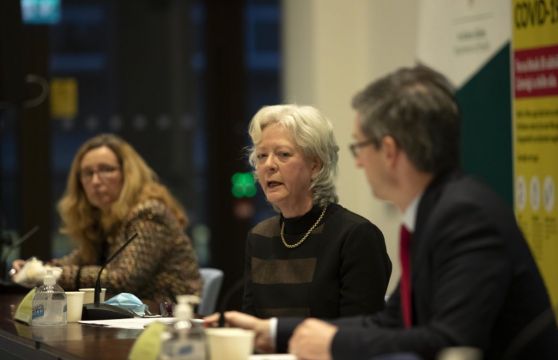Professor Karina Butler, chair of the National Immunisation Advisory Committee (Niac) has said there could be a dividend in the decision to pause the use of the AstraZeneca vaccine for people under the age of 60.
People who will instead be vaccinated using Pfizer will receive their second dose in a shorter time frame, which would mean they are fully vaccinated sooner. This could shorten the vaccine rollout programme, Prof Butler told RTÉ radio’s Morning Ireland.
Niac was trying to steer a safe path through the pandemic and rates of infections were coming down, she said.
“We will get there...We are lucky we have alternatives. It’s not that anyone is being left behind.”
The decision to pause the use of AstraZeneca for the under-60s was taken because there was a higher risk posed by Covid-19 for older people. It was a question of finding a balance, she added.
Prof Butler said she recognised the decision would cause logistical difficulties, but there had to be a delay until they had more information.
She added Niac are scrutinising real world data from the UK, especially from Scotland, where the AstraZeneca vaccine has been used predominantly on the over-70s.
“It takes time to gather information. Until we find out more, there will be a pause,” she said.
Prof Butler acknowledged there had been “several twists and turns and modifications” of the advice from Niac since last December regarding the order of groups being vaccinated.
“We’ve never been in this situation before. As information comes off the boil we are trying to make the best decisions...This calls for incredible patience from the public,” she said.
No hesitancy
Meanwhile, Tánaiste Leo Varadkar has said he would have no hesitancy in taking the AstraZeneca vaccine himself.
Concerns about blood clotting were understandable, he said, but such incidents were rare and the risk from Covid was much higher.
Speaking on Newstalk Breakfast, Mr Varadkar said he thought Niac had made the right call about pausing use of the AstraZeneca shot, adding it would have been a difficult decision for the group to make, and it was too easy for people to “second guess” them.
There were now four vaccines available for use in Ireland and all were very effective and safe, but vaccines were medicines and all medicines could have side effects, he said.

There were half a million people in the country over the age of 60 who were yet to be vaccinated, so they will make “good use” of the AstraZeneca vaccine the Tánaiste added.
Mr Varadkar said the HSE was doing a great job in “pivoting” on the advice from Niac and that while some rescheduling would be required “we could catch up”.
However, Mr Varadkar said he did worry about people being hesitant because of a loss of confidence in AstraZeneca.
As a healthcare professional, as well as a politician, he had no hesitancy in recommending AstraZeneca and would take it himself, he said.







